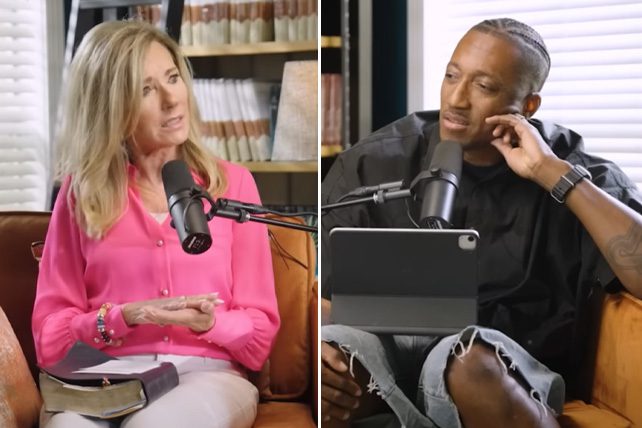On an episode of “Deep End With Lecrae,” author and speaker Beth Moore said her identity has remained in Jesus despite turmoil in the church, her marriage, and U.S. politics.
Moore, 68, answered questions about becoming a Bible teacher, facing backlash, wrestling with issues of submission and power, splitting from the Southern Baptist Convention (SBC), and finding a new spiritual home. She shared the painful “gaping wound” of leaving the SBC and the reason she spoke out in 2016 about Donald Trump.
RELATED: ‘I’ll Get Slammed for This’—Beth Moore Writes Heartfelt Thread to SBC Women
Throughout the discussion, Moore told Christian hip-hop artist Lecrae about her great love for Scripture and the women she teaches. She emphasized that Christ and his cross are “non-negotiable” and that her loyalty lies with Jesus.
Beth Moore: The Submission Debate Is About Power
Beth Moore, founder of Living Proof Ministries, began as a “Christian motivational speaker,” she said. But a Bible doctrine class lit a fire in her, sparking “a voracious appetite to study” God’s Word and find life applications. “I could not keep it to myself,” Moore said, which is “one way you know if you have the gift of teaching.”
Lecrae admitted that when he first heard one of Moore’s Bible studies, he felt conflicted. The faith tradition he grew up in “was telling me I could not receive this type of instruction from a woman,” he recalled. “But this [content] is so good.”
First Baptist Church of Houston was a “safe place to learn how to teach” and be a “servant-leader” with “all the freedom that I wanted,” said Moore. After her Bible studies were published, unfavorable reactions began—and spread, thanks to the “fishbowl” of social media. But when Moore asked her critics if they had ever done one of her studies, they said, “No, because they couldn’t be taught by a woman.”
Although Moore grew up in the church and “understood the concept of submission,” she said she began realizing the SBC used it for power—and to “make sure that women stayed down.” That meant women were “expendable,” even when they “suffer abuse or we are somehow mistreated and disesteemed.”
Moore began “having a problem” with the SBC, she explained, “when protecting the pulpit [became] more important than protecting women and children,” because women are “my whole ministry.” Discovering that power dynamic was “catastrophic to me,” she added, and she refused to teach that version of submission.
Blessings Amid the Turmoil
Losing favor with and leaving the SBC meant that Beth Moore lost her sense of belonging and entered an “abyss,” she said. Breaking from her church heritage was “such a gaping wound, such a hemorrhage” that she had to unfollow people on social media to avoid being “constantly reminded of what I’ve lost.” In addition to grief, Moore felt “flat-out scandalized.”
Although she now sees how God has blessed the journey, Moore said, “Never in a million years would I have chosen how it happened.” But she learned that her identity needs to stay anchored in Christ, not in a particular denomination. “I’m going to identify myself as a Jesus-follower,” Moore said. “To the death. I pray to the death.”
Her public split with the SBC has also helped Moore reach women from other faith traditions, she told Lecrae. These readers and conference attendees tell her she wouldn’t have been on their radar if she had stayed within the SBC. That wasn’t an intentional strategy, Moore said, but it has played into her mission of reaching people who are “hungry for the Scriptures.”

